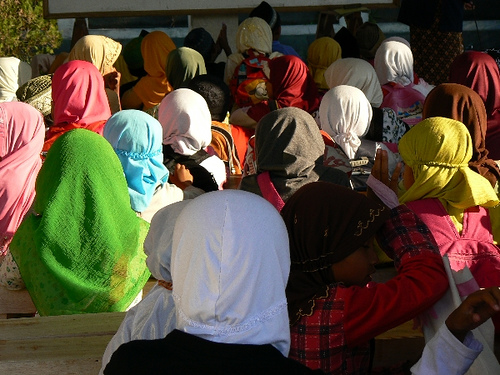
Indonesia has long been known as a vibrant, tolerant and resilient country. With the world’s largest Muslim population, a fledgling democracy and a surprisingly vibrant economy (with corruption and poor infrastructure still hampering growth), Indonesia has, quite spectacularly, turned doomsday scenarios in the turbulent aftermath of the Suharto era to a laudable success story of post-colonial and post-authoritarian reconstruction.
While the economy bubbles along (surprisingly well given the global circumstances, as an Economist Special Report noted last year), Indonesian society is going through a process of self-discovery. With roots in arguably the most historically pluralistic form of Islam practiced in the Muslim world, Indonesians are looking to find their footing somewhere in between these roots and the shoots of a modern society that pushes for women’s rights, freedom of expression and further tolerance.
Even though Islamic political parties have never dominated the public realm in Indonesia (à la Malaysia, for example) with their support dropping by more than 10 percent to 26 percent in the 2009 legislative elections, a degree of accommodation has characterized the political process in the past. Although the government has been resolute in its pursuit of radical extremists, among them the infamous Jemaah Islamiyah group, it has also tolerated groups, preachers and religious schools that promote a more orthodox and intolerant (and arguably un-Indonesian) form of Islam.
Pieces of legislation like the notorious 2008 anti-pornography bill that banned “images, gestures and talk deemed to be pornographic” was a test case for the strength of the conservative forces in the country. Although it passed, opposition was vociferous and the bill ultimately watered down amid widespread protests, particularly in overwhelmingly Hindu Bali.
Although Islamic parties have limited direct influence in the political realm, the influence of clerical groups, chief among them the Indonesian Ulema Council (MUI) cannot be overlooked. Their sway over the daily life of pious Indonesians can be significant as they rule over the permissibility of things like interfaith marriage and prayer (both have been declared as haram, forbidden under Islamic law).
The government and other groups have periodically risen up against the perceived intolerance of these edicts with the head of an affiliated Islamic organization, the Nahdhatul Ulama arguing in 2005 that such rulings took religion out of its social context and were misplaced because “we live in a diverse society and this is not an Islamic state.”
Most recently, the overzealous clerics of the MUI have declared aerobics (due to the “sexy attire”) and Valentine’s Day haram. Arguing that it needs to act as the “moral compass” of Indonesian Muslims the MUI claims that such bans counter the inevitable demise of morals in Indonesian society. In response to the Valentine’s Day ban an adviser to the vice president argued that “the substance of Valentine’s Day is love, and love is the basis of Islam,” warning the council that too many bans may end up watering down their overall impact.
As another controversial law makes its way through parliament, this time on marriage (a key component of the law is the banning of so-called temporary marriages that in effect legalize polygamy), the battle for Indonesia’s societal and cultural space rages on.
The outcome may be uncertain, but at least it is being fought out in the open and with laws and ballots, not guns.

